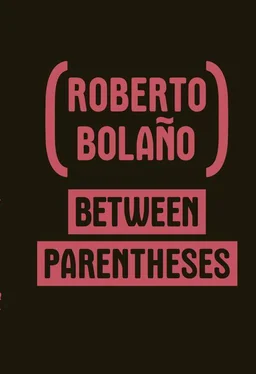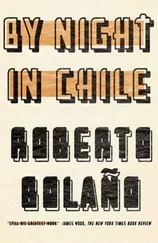Roberto Bolaño - Between Parentheses - Essays, Articles and Speeches, 1998-2003
Здесь есть возможность читать онлайн «Roberto Bolaño - Between Parentheses - Essays, Articles and Speeches, 1998-2003» весь текст электронной книги совершенно бесплатно (целиком полную версию без сокращений). В некоторых случаях можно слушать аудио, скачать через торрент в формате fb2 и присутствует краткое содержание. Год выпуска: 2011, Издательство: New Directions, Жанр: Публицистика, Критика, на английском языке. Описание произведения, (предисловие) а так же отзывы посетителей доступны на портале библиотеки ЛибКат.
- Название:Between Parentheses: Essays, Articles and Speeches, 1998-2003
- Автор:
- Издательство:New Directions
- Жанр:
- Год:2011
- ISBN:нет данных
- Рейтинг книги:4 / 5. Голосов: 1
-
Избранное:Добавить в избранное
- Отзывы:
-
Ваша оценка:
- 80
- 1
- 2
- 3
- 4
- 5
Between Parentheses: Essays, Articles and Speeches, 1998-2003: краткое содержание, описание и аннотация
Предлагаем к чтению аннотацию, описание, краткое содержание или предисловие (зависит от того, что написал сам автор книги «Between Parentheses: Essays, Articles and Speeches, 1998-2003»). Если вы не нашли необходимую информацию о книге — напишите в комментариях, мы постараемся отыскать её.
The Savage Detectives
Between Parenthese
Between Parentheses: Essays, Articles and Speeches, 1998-2003 — читать онлайн бесплатно полную книгу (весь текст) целиком
Ниже представлен текст книги, разбитый по страницам. Система сохранения места последней прочитанной страницы, позволяет с удобством читать онлайн бесплатно книгу «Between Parentheses: Essays, Articles and Speeches, 1998-2003», без необходимости каждый раз заново искать на чём Вы остановились. Поставьте закладку, и сможете в любой момент перейти на страницу, на которой закончили чтение.
Интервал:
Закладка:
Chile’s four great poets
are three:
Alonso de Ercilla and Rubén Darío.
As you know, Alonso de Ercilla was a Spanish soldier, noble and dashing, who fought in the colonial wars against the Araucanians and upon his return to his native Castilla wrote La Araucana , which for Chileans is our foundational fiction and for lovers of poetry and history is a wonderful book, full of daring and generosity. Rubén Darío, as you also know, and if you don’t it doesn’t matter — we know so little, even about ourselves — was the creator of modernism and one of the most important Spanish-language poets of the twentieth century, probably the most important, a poet who was born in Nicaragua in 1867 and died in Nicaragua in 1916, and who arrived in Chile at the end of the nineteenth century, where he made good friends and read good books, but where he was also treated as an Indian or a cabecita negra by a Chilean ruling class that has always boasted of belonging 100 percent to the white race. So when Parra says that the best Chilean poets are Ercilla and Darío, who both spent time in Chile and had formative experiences in Chile (Alonso de Ercilla in the war and Darío in drawing room skirmishes), and who wrote in Chile and about Chile and in the lingua franca of Spanish, he’s telling the truth, and not only does he resolve the by now boring question of the four greats, he also raises new questions, blazes new paths, and meanwhile his poem or artifact , which is what Parra calls these short texts, is a variation or spoof on the Huidobro poem that goes like this:
The four cardinal points
Are three
South and north.
Huidobro’s poem is excellent and I like it very much — it’s aerial verse, like much of Huidobro’s poetry — but I like Parra’s variation/spoof even better. It’s like an explosive device set there to open our eyes and shake the nonsense out of us Chileans, it’s a poem that explores the fourth dimension, as Huidobro intended, but a fourth dimension of the national consciousness, and although at first glance it seems like a joke, and it actually is a joke, at second glance it’s revealed to be a declaration of human rights. It’s a poem that tells the truth, at least to us contrite and hardworking Chileans, in other words that our four great poets are Ercilla and Darío, the first of whom died in his native Castilla in 1594, after a life as an inveterate traveler (he was page to Philip II and traveled through Europe and then fought in Chile under Alderete and in Peru under García Hurtado de Mendoza), and the second of whom died in 1916 (two years after the death of Trakl) in his native Nicaragua after having lived practically his entire life abroad.
And now that I’ve mentioned Trakl, let me digress, because it occurs to me that when Trakl gave up his studies and went to work as a druggist’s apprentice, at the tender but no longer innocent age of eighteen, he was also choosing exile — and choosing it in a natural way — because going to work for a druggist at eighteen is a form of exile, just as drug addiction is a form of exile, and incest another, as the Ancient Greeks knew very well. So we’ve got Rubén Darío and we’ve got Alonso de Ercilla, who are the four great Chilean poets, and we’ve got the first thing that Parra’s poem teaches us, which is that we don’t have Darío or Ercilla, that we can’t appropriate them, only read them, which is enough.
The second thing that Parra’s poem teaches us is that nationalism is wretched and collapses under its own weight. If the expression “collapses under its own weight” doesn’t make sense to you, imagine a statue made of shit slowly sinking into the desert: well, that’s what it means for something to collapse under its own weight. And the third thing that Parra’s poem teaches us is that probably our two best poets, Chile’s best poets, were a Spaniard and a Nicaraguan who swung through these southern lands, one as a soldier and a person of great intellectual curiosity, the other as an immigrant, a penniless young man eager to make a name for himself, neither of them with any intention of staying, neither with any intention of becoming a great Chilean poet, simply two people, two travelers. And now I’d say it’s clear what I think about literature and exile, or literature and banishment.
2. Fragments of a Return to the Native Land
Exiles
To be exiled is not to disappear but to shrink, to slowly or quickly get smaller and smaller until we reach our real height, the true height of the self. Swift, master of exile, knew this. For him exile was the secret word for journey . Many of the exiled, freighted with more suffering than reasons to leave, would reject this statement.
All literature carries exile within it, whether the writer has had to pick up and go at the age of twenty or has never left home.
Probably the first exiles on record were Adam and Eve. This is indisputable and it raises a few questions: Can it be that we’re all exiles? Is it possible that all of us are wandering strange lands?
The concept of “strange lands” (like that of “home ground”) has some holes in it, presents new questions. Are “strange lands” an objective geographic reality, or a mental construct in constant flux?
Let’s recall Alonso de Ercilla.
After a few trips through Europe, Ercilla, soldier and nobleman, travels to Chile and fights the Araucanians under Alderete. In 1561, when he’s not yet thirty, he returns and settles in Madrid. Twenty years later he publishes La Araucana , the best epic poem of his age, in which he relates the clash between Araucanians and Spaniards, with clear sympathy for the former. Was Ercilla in exile during his American ramblings through the lands of Chile and Peru? Or did he feel exiled when he returned to court, and is La Araucana the fruit of that morbus melancholicus , of his keen awareness of a kingdom lost? And if this is so, which I can’t say for sure, what has Ercilla lost in 1589, just five years before his death, but youth? And with his youth, the arduous journeys, the human experience of being exposed to the elements of an enormous and unknown continent, the long rides on horseback, the skirmishes with the Indians, the battles, the shadows of Lautaro and Caupolicán that, as time passes, loom large and speak to him, to Ercilla, the only poet and the only survivor of something that, when set down on paper, will be a poem, but that in the memory of the old poet is just a life or many lives, which amounts to the same thing.
And what is Ercilla left with before he writes La Araucana and dies? Ercilla is left with something — if in its most extreme and bizarre form — that all great poets possess. He’s left with courage. A courage worth nothing in old age, just as, incidentally, it’s worth nothing in youth, but that keeps poets from throwing themselves off a cliff or shooting themselves in the head, and that, in the presence of a blank page, serves the humble purpose of writing.
Exile is courage. True exile is the true measure of each writer.
At this point I should say that at least where literature is concerned, I don’t believe in exile. Exile is a question of tastes, personalities, likes, dislikes. For some writers exile means leaving the family home; for others, leaving the childhood town or city; for others, more radically, growing up. There are exiles that last a lifetime and others that last a weekend. Bartleby, who prefers not to, is an absolute exile, an alien on planet Earth. Melville, who was always leaving, didn’t experience — or wasn’t adversely affected by — the chilliness of the word exile . Philip K. Dick knew better than anyone how to recognize the disturbances of exile. William Burroughs was the incarnation of every one of those disturbances.
Читать дальшеИнтервал:
Закладка:
Похожие книги на «Between Parentheses: Essays, Articles and Speeches, 1998-2003»
Представляем Вашему вниманию похожие книги на «Between Parentheses: Essays, Articles and Speeches, 1998-2003» списком для выбора. Мы отобрали схожую по названию и смыслу литературу в надежде предоставить читателям больше вариантов отыскать новые, интересные, ещё непрочитанные произведения.
Обсуждение, отзывы о книге «Between Parentheses: Essays, Articles and Speeches, 1998-2003» и просто собственные мнения читателей. Оставьте ваши комментарии, напишите, что Вы думаете о произведении, его смысле или главных героях. Укажите что конкретно понравилось, а что нет, и почему Вы так считаете.












